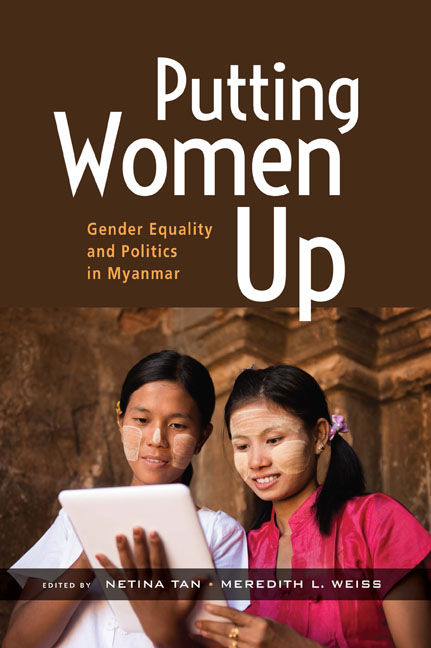Book contents
- Frontmatter
- Contents
- List of Tables
- List of Figures
- Acronyms and Glossary
- Acknowledgements
- About the Contributors
- 1 Putting Women Up: Promoting Gender Equality in Myanmar Politics
- 2 The Secret Garden of Candidate Selection and Women’s Political Participation
- 3 Ethnic Parties, Representation, and Female Candidate Recruitment in Myanmar
- 4 Attitudes Towards Women and Political Leadership
- 5 Violence, Gender, and Politics
- 6 Navigating Local Politics and Gender
- Appendix One Background of Selected Political Parties and Vote Shares
- Appendix Two Survey Questions
- Appendix Three Focus Group Guide for Field Data Collection
- Appendix Four Interview Guide Used for Field Data Collection
- Appendix Five Samples of Elite Interview Questions
- Index
2 - The Secret Garden of Candidate Selection and Women’s Political Participation
Published online by Cambridge University Press: 18 April 2024
- Frontmatter
- Contents
- List of Tables
- List of Figures
- Acronyms and Glossary
- Acknowledgements
- About the Contributors
- 1 Putting Women Up: Promoting Gender Equality in Myanmar Politics
- 2 The Secret Garden of Candidate Selection and Women’s Political Participation
- 3 Ethnic Parties, Representation, and Female Candidate Recruitment in Myanmar
- 4 Attitudes Towards Women and Political Leadership
- 5 Violence, Gender, and Politics
- 6 Navigating Local Politics and Gender
- Appendix One Background of Selected Political Parties and Vote Shares
- Appendix Two Survey Questions
- Appendix Three Focus Group Guide for Field Data Collection
- Appendix Four Interview Guide Used for Field Data Collection
- Appendix Five Samples of Elite Interview Questions
- Index
Summary
Whom political parties select for elections is key to understanding how women access elected office. In this chapter, we investigate whom parties nominated as candidates and how the selection process occurred in Myanmar before the coup in 2021, focusing on the nine political parties identified in Chapter One. During Myanmar's short decade of liberalization, political parties flourished and competed in general elections (GE). In the 2020 elections alone, a total of 93 parties competed, 50 more than in 2010. That independent candidates comprised less than 5 per cent of total candidates in 2020's national and local elections indicates that parties are the primary means through which individuals become politicians.
Parties matter as they provide leadership, organization, resources, and name-recognition for candidates (Kunovich and Paxton 2005a; Aldrich 2011). Literature on electoral politics in Myanmar has largely focused on the dominant role of the military, including its politicalparty guise as the Union Solidarity and Development Party (USDP), or on political elites such as Aung San Suu Kyi from the National League for Democracy (NLD). Despite the importance of parties and the role they play in selecting candidates for elections, we know very little about these processes—what Gallagher and Marsh (1988) call the “secret garden of politics”—during Myanmar's decade of liberalization.
Intra-party politics in Myanmar are opaque and clouded in mystery. This chapter aims to demystify a core process by comparing the key candidate-selection methods in nine parties and their effects on women's political participation. In Asia, Myanmar has had one of the lowest levels of female representation in legislatures from 2010 to 2020. Typically, respondents cite cultural factors such as patriarchy as key deterrents that affect the supply of female candidates (Zin Mar Aung 2015). Here, we go beyond cultural reasons by revealing other institutional factors, such as the role of the selectorate—the body that selects candidates—and the criteria each party looks for that affect the demand for women in politics.
Parties are gatekeepers that narrow the list of candidates to a small pool from which the voters will choose. Who selects and how the process is implemented in practice affect not only party cohesion but also its gender and ethnic diversity (Rahat and Hazan 2001; Tan et al. 2020). Typically, parties have a legal or written framework that establishes how they elect or select their candidates.
- Type
- Chapter
- Information
- Putting Women UpGender Equality and Politics in Myanmar, pp. 32 - 56Publisher: ISEAS–Yusof Ishak InstitutePrint publication year: 2024

